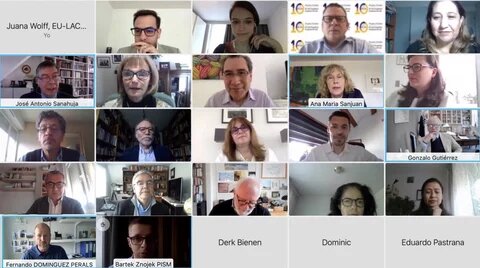The EU-LAC Foundation together with the Fundación Carolina organised the first Workshop of the joint project "Network of Association Agreements between the European Union and Latin America and the Caribbean", which took place on May 20.
The two foundations have agreed to carry out a comprehensive study on the network of Association Agreements between the European Union and Latin America and the Caribbean. As a result of this study, a series of virtual workshops are held from 20th of May to 1st of July 2021 with the participation of the main stakeholders in each of the Association Agreements (governments, officials from both regions, experts, parliamentarians, private sector and civil society organisations).
The first workshop first presented the progress of the study carried out on the Multi-Party Agreement (EU-Colombia/EU-Ecuador/EU-Peru) with a presentation by Prof. Alain Fairlie (Professor at the Pontificia Universidad Católica del Perú). This was followed by a presentation on the EU-Chile Association Agreement by Beatriz Hernández (Universidad Diego Portales de Chile) and a further debate.
The initiative aims at reviewing the mapping of the association agreements between both regions to identify to what extent their ratification, modernisation and full use can contribute to a better international insertion, in economic matters and the international relations of each party. The study also looks at the transitions that must be undertaken in the EU and Latin America in aspects such as sustainable development, digitalisation, and social cohesion.
The participants highly valued this opportunity to reflect on the commercial flows between both regions, to identify technical difficulties in the implementation of the agreements and the role of monitoring bodies. The presentations discussed specific cooperation programmes and their implications on trade level, and sustainable development. Hereby, they stressed that the post-pandemic context presents an opportunity for the generation of bi-regional strategies that promote green economic growth in both regions, not at the cost of the environment.
